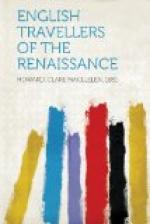His is the best known, probably, of all our treatises, partly because it was reprinted a little while ago by Mr Gosse, and partly because of its own merits. Howell had an easier, more indulgent outlook upon the world than Dallington, and could see all nations with equal humour—his own included. Take his comparison of the Frenchman and the Spaniard.
The Frenchman “will dispatch the weightiest affairs as hee walke along in the streets, or at meales, the other upon the least occasion of businesse will retire solemnly to a room, and if a fly chance to hum about him, it will discompose his thoughts and puzzle him: It is a kind of sicknesse for a Frenchman to keep a secret long, and all the drugs of Egypt cannot get it out of a Spaniard.... The Frenchman walks fast, (as if he had a Sergeant always at his heels,) the Spaniard slowly, as if hee were newly come out of some quartan Ague; the French go up and down the streets confusedly in clusters, the Spaniards if they be above three, they go two by two, as if they were going a Procession; etc. etc."[245]
With the same humorous eye he observes the Englishmen returned to London from Paris, “whom their gate and strouting, their bending in the hammes, and shoulders, and looking upon their legs, with frisking and singing do speake them Travellers.... Some make their return in huge monstrous Periwigs, which is the Golden Fleece they bring over with them. Such, I say, are a shame to their Country abroad, and their kinred at home, and to their parents, Benonies, the sons of sorrow: and as Jonas in the Whales belly, travelled much, but saw little."[246]
These are some of the advantages an Englishman will reap from foreign travel:
“One shall learne besides there not to interrupt one in the relation of his tale, or to feed it with odde interlocutions: One shall learne also not to laugh at his own jest, as too many used to do, like a Hen, which cannot lay an egge but she must cackle.
“Moreover, one shall learne not to ride so furiously as they do ordinarily in England, when there is no necessity at all for it; for the Italians have a Proverb, that a galloping horse is an open sepulcher. And the English generally are observed by all other Nations, to ride commonly with that speed as if they rid for a midwife, or a Physitian, or to get a pardon to save one’s life as he goeth to execution, when there is no such thing, or any other occasion at all, which makes them call England the Hell of Horses.
“In these hot Countreyes also, one shall learne to give over the habit of an odde custome, peculiar to the English alone, and whereby they are distinguished from other Nations, which is, to make still towards the chimney, though it bee in the Dog-dayes."[247]
We need not comment in detail upon Howell’s book since it is so accessible. The passage which chiefly marks the progress of travel for study’s sake is this:




